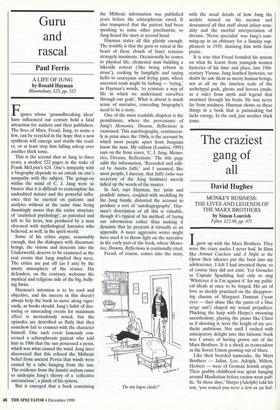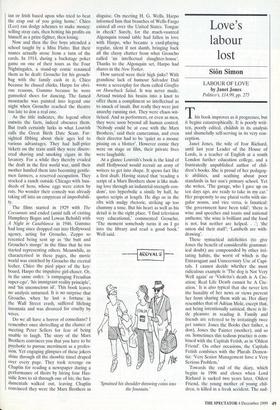The craziest gang of all
David Hughes
MONKEY BUSINESS: THE LIVES AND LEGENDS OF THE MARX BROTHERS by Simon Louvish Faber, f12.99, pp. 471
Igrew up with the Marx Brothers. They were the crazy uncles I never had. In films like Animal Crackers and A Night at the Opera their idiocies put the boot into my adolescence. I felt I had invented them, so of course they did not exist. Yet Groucho as Captain Spaulding had only to sing 'Whatever it is I'm against it' for my politi- cal ideals at once to be forged. His art of love as sleekly practised on the disapprov- ing charms of Margaret Dumont ('your eyes — they shine like the pants of a blue serge suit') shaped my sexual prejudices. Plucking the harp with Harpo's swooning unorthodoxy, playing the piano like Chico as if shooting it, were the height of my aes- thetic ambitions. Not until I rushed with anticipatory delight into this fulsome book was I aware of having grown out of the Marx Brothers. It is a shock as tremendous as the Soviet Union growing out of Marx.
Like their bearded namesake, the Marx Brothers — Julius, Leo, Adolph, Milton, Herbert — were of German Jewish origin. Their grubby childhood was spent hanging around Manhattan before racism went pub- lic. 'In those days,' Harpo (Adolph) told his son, 'you sensed you were a Jew or an Ital- ian or Irish based upon who tried to beat the crap out of you going home.' Chico (Leo) ran dodgy schemes to make money: selling stray cats, then betting his profits on himself as a prize-fighter, then losing.
Now and then the five boys attended a school taught by a Miss Flatto. But their names actually arose from a turn of the cards. In 1914, during a backstage poker game an one of their tours as the Four Nightingales, a stand-up comic renamed them as he dealt: Groucho for his grouch- bag with the family cash in it, Chico because he chased chicks, Harpo for obvi- ous reasons, Gummo because he wore gumsoled shoes for dancing. The famed moustache was painted into legend one night when Groucho reached the theatre too late to don a real one.
As the title indicates, the legend often outwits the facts, indeed obscures them. But truth certainly lurks in what Louvish calls the Great Birth Date Scam. Far- sighted fibbing about their ages led to various advantages. They had half-price tickets on the train until they were discov- ered shaving and smoking cigars in the lavatory. For a while they thereby evaded the draft in the first world war, until their mother hustled them into becoming gentle- men farmers, a reserved occupation. They stocked a ranch outside Chicago with hun- dreds of hens, whose eggs were eaten by rats. No wonder their comedy was already taking off into an empyrean of improbabili- ty.
The films started in 1929 with The Cocoanuts and ended (amid talk of casting Humphrey Bogus and Lowan Behold) with A Night in Casablanca in 1946. Gummo had long since dropped out into Hollywood agency, acting for Groucho. Zeppo so resented being sent up as 'the butt and Groucho's stooge' in the films that he too started representing others. Meanwhile, as characterised in these pages, the movie world was enriched by Groucho the eternal lecher, Chico the pied piper of the key- board, Harpo the impulsive girl-chaser. Or, in the same order, 'a rampaging Freudian super-ego', 'his immigrant reality principle', and 'his unconscious id'. This book leaves no analysis unturned. It is no surprise that Groucho, when he lost a fortune in the Wall Street crash, suffered lifelong insomnia and was divorced for cruelty by wives.
Do we all have a horror of comedians? I remember once shrivelling at the chance of meeting Peter Sellers for fear of being unable to laugh. The story of the Marx Brothers convinces you that you have to be psychotic to pursue merriment as a profes- sion. Yet engaging glimpses of these jokers shine through all the showbiz tinsel draped over every page. They took revenge on Chaplin for reading a newspaper during a Performance of theirs by hiring four Has- sidic Jews to sit through one of his; the fun- damentals walked out, leaving Chaplin convinced they were the Marx Brothers in
disguise. On meeting H. G. Wells, Harpo informed him that branches of Wells-Fargo existed all over the United States. Tongue in cheek? Surely, for the much-vaunted Algonquin round table had fallen in love with Harpo, who became a card-playing regular, silent if not dumb, bringing back all the classy chatter from what Groucho called 'an intellectual slaughter-house'. Thanks to the Algonquin set, Harpo had shares in the New Yorker.
How surreal were their high jinks? With grandiose lack of humour Salvador Dali wrote a screenplay for them called Giraffes on Horseback Salad. It was never made. Artaud twisted his brains into a knot to offer them a compliment so intellectual as to smack of insult. But really they were just anarchy running riot. They were chaos wit- ticised. And as performers, or even as men, they were soon beyond all human control. 'Nobody could be at ease with the Marx Brothers,' said their cameraman, and even their director had to be 'quiet as a mouse pissing on a blotter'. However comic they were on stage or film, their private lives were laughable.
At a glance Louvish's book is the kind of stuff Hollywood would recruit an army of writers to get into shape. It spews fact like a first draft. Having stated that 'reading a script of a Marx Brothers show is like mak- ing love through an industrial-strength con- dom', too hyperbolic a simile by half, he quotes scripts at length. He digs us in the ribs with nudgy rhetoric, striking up too chummy a tone. But his heart as well as his detail is in the right place. 'I find television very educational,' commented Groucho. 'The moment somebody turns it on I go into the library and read a good book.' Well said.
'Sprained his shoulder throwing coins into the fountain.'



















































































 Previous page
Previous page